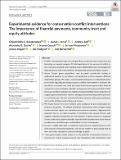Files in this item
Experimental evidence for conservation conflict interventions : the importance of financial payments, community trust and equity attitudes
Item metadata
| dc.contributor.author | Rakotonarivo, Onjamirindra S. | |
| dc.contributor.author | Jones, Isabel L. | |
| dc.contributor.author | Bell, Andrew | |
| dc.contributor.author | Duthie, Alexander B. | |
| dc.contributor.author | Cusack, Jeremy | |
| dc.contributor.author | Minderman, Jeroen | |
| dc.contributor.author | Hogan, Jessica | |
| dc.contributor.author | Hodgson, Isla | |
| dc.contributor.author | Bunnefeld, Nils | |
| dc.date.accessioned | 2020-10-16T14:30:05Z | |
| dc.date.available | 2020-10-16T14:30:05Z | |
| dc.date.issued | 2020-10-14 | |
| dc.identifier | 270734185 | |
| dc.identifier | 0240b1de-3e2f-49c8-8640-36f4fdd0c462 | |
| dc.identifier | 85106321552 | |
| dc.identifier | 000647696600012 | |
| dc.identifier.citation | Rakotonarivo , O S , Jones , I L , Bell , A , Duthie , A B , Cusack , J , Minderman , J , Hogan , J , Hodgson , I & Bunnefeld , N 2020 , ' Experimental evidence for conservation conflict interventions : the importance of financial payments, community trust and equity attitudes ' , People and Nature , vol. Early View . https://doi.org/10.1002/pan3.10155 | en |
| dc.identifier.issn | 2575-8314 | |
| dc.identifier.other | RIS: urn:8862719C2C1A9FE9F626B1A502E6C339 | |
| dc.identifier.uri | https://hdl.handle.net/10023/20790 | |
| dc.description | Funding for this study was provided by the European Research Council under the European Union's H2020/ERC grant agreement no. 679651 (ConFooBio) to N.B. The experimental game was derived from NonCropShare, which was produced with financial support from the CGIAR Research Program on Water, Land and Ecosystems (WLE) and the CGIAR Research Program on Policies, Institutions and Markets (PIM). A.B.D. is supported by a Leverhulme Trust Early Career Fellowship. | en |
| dc.description.abstract | 1. Conflicts between the objectives of agricultural production and conservation are becoming increasingly complex. Of vital importance to the success of conflict interventions is a detailed understanding of how stakeholders react to management interventions as well as the influence of interacting social and political factors. 2. Across Europe, goose populations have increased considerably, leading to widespread impacts on agriculture and significant conflicts between different stakeholder groups. We used a novel experimental game to understand farmer preferences regarding the design of goose conflict interventions in Scotland. We specifically examined how three alternative interventions (government financial support for scaring activities, subsidies and agglomeration payments that include bonus payments for adoption by neighbouring farms) affect farmer propensity to support goose conservation interests through reduced shooting and the provision of sacrificial crops. We also examined the links between within-game behaviour and real-life attributes and attitudes of farmers. 3. We found that all three interventions were conducive to pro-conservation behaviour in the games. The effects of all three interventions were stronger among farmers who had higher trust towards other community members. Agglomeration payments led to increased provision of sacrificial crops among farmers with negative attitudes towards the current allocation of goose finances in Scotland. Farmers with more positive attitudes towards wildlife tourism were more likely to provide more sacrificial crops, and less likely to shoot in the games. 4. Farmers' real-life traits had a statistically significant but marginal impact on the effectiveness of financial payments, such as the number of geese being shot on their own lands, remoteness and crop damage by geese. 5. These game results provide evidence for the potential of innovative financial instruments in conflict management and their interactions with social factors such as community trust, equity attitude and real-life shooting levels. Our study highlights the importance of socio-political elements in fostering mutually beneficial outcomes in conservation conflicts in addition to addressing material losses to wildlife. We also show how games can help in addressing conservation conflicts in a wide range of settings. | |
| dc.format.extent | 14 | |
| dc.format.extent | 1603952 | |
| dc.language.iso | eng | |
| dc.relation.ispartof | People and Nature | en |
| dc.subject | Agriculture | en |
| dc.subject | Experimental game | en |
| dc.subject | Geese | en |
| dc.subject | Human–wildlife conflict | en |
| dc.subject | Monetary incentives | en |
| dc.subject | Scotland | en |
| dc.subject | QH301 Biology | en |
| dc.subject | S Agriculture (General) | en |
| dc.subject | DAS | en |
| dc.subject | SDG 2 - Zero Hunger | en |
| dc.subject.lcc | QH301 | en |
| dc.subject.lcc | S1 | en |
| dc.title | Experimental evidence for conservation conflict interventions : the importance of financial payments, community trust and equity attitudes | en |
| dc.type | Journal article | en |
| dc.contributor.institution | University of St Andrews. Environmental Change Research Group | en |
| dc.contributor.institution | University of St Andrews. School of Geography & Sustainable Development | en |
| dc.identifier.doi | https://doi.org/10.1002/pan3.10155 | |
| dc.description.status | Peer reviewed | en |
This item appears in the following Collection(s)
Items in the St Andrews Research Repository are protected by copyright, with all rights reserved, unless otherwise indicated.

